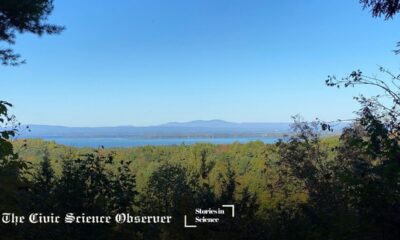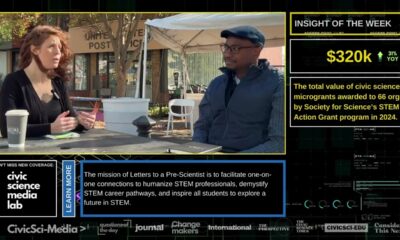Stories in Science Special Series
Scientist, Educator, or Both?
Dr. Khameeka Kitt-Hopper: “There are so many questions still unanswered, and my role as a scientist is to shed light on these basic questions and encourage a new generation of diverse scientists ready to take on the challenging conundrums of the world.”

Khameeka Kitt-Hopper
[su_boxbox title=”About”]Dr. Khameeka Kitt-Hopper is an Assistant Professor at her alma mater, Saint Mary’s College of California (SMC). You can read her research HERE. [/su_boxbox]
[dropcap]S[/dropcap]ince I was a child I have always been interested in the human body and how we are in essence “put together”. Observing how animals were anatomically organized from watching my father prepare birds and deer he hunted to learning about science concepts in grade school opened my eyes to the beauty of life. However, once I got to high school I learned I had a real knack for the subject. My Honors Biology teacher approached me about how well I had done on some of my biology assignments. She mentioned that I should consider biology as a major when I went to college because I had a real talent for science. In many ways, this vote of confidence in my abilities planted the seed to help me become who I am today.

Khameeka Kitt-Hopper
My journey in science and medicine has not been an easy road. But, with the support of my parents and family, peers and various mentors along the way, I have made it to where I am today as an Assistant Professor at my alma mater, Saint Mary’s College of California (SMC). My love for science and medicine blossomed as a student at SMC and motivated me to become a college professor. Being a student at a small liberal arts college is a very unique experience.
Small class sizes, no teaching assistants, professors knowing your name, and learning to engage in meaningful and engaging conversation with faculty and students are just some of the experiences I had as a student at SMC. I observed how the faculty at SMC truly cared about their students’ success, and I decided that I wanted to educate and inspire the future generation of scientists and scholars and foster understanding and respect for our ever-changing world. After participating in an Initiative for Maximizing Student Development (IMSD) summer research program at the University of Arizona, I entered the graduate program there after receiving my bachelors degree from SMC and went on to get my Ph.D. in Cell Biology.
There are so many questions still unanswered, and my role as a scientist is to shed light on these basic questions and encourage a new generation of diverse scientists ready to take on the challenging conundrums of the world.
I have always been interested in the intricate details of the mammalian cell. I find it absolutely fascinating how cells of the body fit together like an intricate lego set – each piece in its appropriate location. In some ways cellular maintenance and growth is similar to human relationships. When we are young, our relationships are always being pruned and people come and go in our lives as we navigate various milestones. Cell growth is the same from conception through early adulthood; cells are constantly modifying their cellular contacts to find the best and most stable fit for growth and maintenance.
Eventually, as we age, human relationships become relatively more stable and we become more selective and invested in the relationships we have already made. Furthermore, losing relationship(s) can be hurtful and take a toll on our mind and body. Similarly, established cellular contacts later in adulthood become very important to maintain. Loss of those contacts can be detrimental to the health of an individual and can lead to many conditions and diseases. One of these well-known diseases is cancer. Cells of the body go rogue in this complex disease, and scientists have been working tirelessly to understand the switch that causes the cellular DNA to mutate, transform and eventually show its destructive behavior. There are so many questions still unanswered, and my role as a scientist is to shed light on these basic questions and encourage a new generation of diverse scientists ready to take on the challenging conundrums of the world.
My current interests focus on the dynamics of how established epithelial cells (e.g. kidney, intestinal, breast cells) make contacts with neighboring epithelial cells and how cellular proteins serve as “the glue” to orchestrate this dynamic process. Loss of these particular cellular proteins can lead the cell down a slippery slope and tilt the scale of cellular events toward tumor initiation. Therefore, understanding how these proteins function under normal conditions facilitates our understanding of cancer development and metastasis.
As I navigated the complexity of cellular contacts during my postdoctoral fellowship, I also became passionate about mentoring undergraduates and how scientific details are communicated in the public domain. I got involved with the San Jose Science Tech Museum educating youth and the community about DNA and cell biology through hands-on demonstrations and writing responses to genetic-related questions. This experience opened up the door for me to get more involved in Bay Area communities and deliver seminars about the cell biology behind cancer at local breast cancer awareness conferences and universities.
Furthermore, I mentored undergraduates in the lab and watched them become budding scientists in the making. All of these experiences and opportunities over the years helped me realize that I could be both a scientist and educator. My mission in life has evolved to not only help my students see themselves as scientists as they weave together the symbiotic relationship of scientific discovery and medical breakthroughs, but to also educate and engage students to take ownership of their education and “teach out” their knowledge.
My success comes from watching my students succeed in not only the courses I am teaching, but also in moving on to the next level of their pursuit for knowledge. Overall, I see my role as a professor is to help students realize their potential, cultivate their knowledge, and watch them find their own path to follow.
Metrics
Sessions
Total number of Sessions. A session is the period time a user is actively engaged with the page.
Visitors
Users that have had at least one session within the selected date range. Includes both new and returning users.
Page views
Pageviews is the total number of time the article was viewed. Repeated views are counted.
The CS Media Lab is a Boston-anchored civic science news collective with local, national and global coverage on TV, digital print, and radio through CivicSciTV, CivicSciTimes, and CivicSciRadio. Programs include Questions of the Day, Changemakers, QuickTake, Consider This Next, Stories in Science, Sai Resident Collective and more.

-
Audio Studio1 month ago
“Reading it opened up a whole new world.” Kim Steele on building her company ‘Documentaries Don’t Work’
-
 Civic Science Observer1 week ago
Civic Science Observer1 week ago‘Science policy’ Google searches spiked in 2025. What does that mean?
-
Civic Science Observer1 month ago
Our developing civic science photojournalism experiment: Photos from 2025
-
Civic Science Observer1 month ago
Together again: Day 1 of the 2025 ASTC conference in black and white
Contact
Menu
Designed with WordPress
























